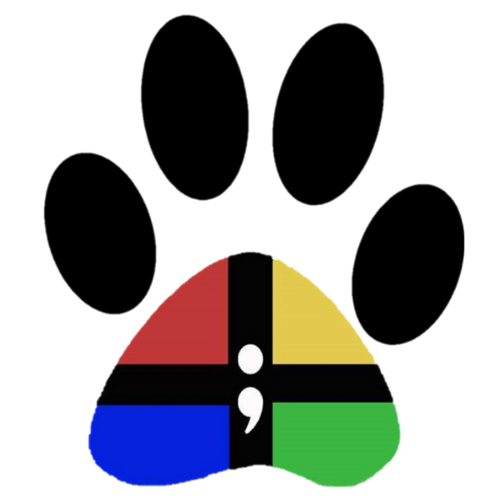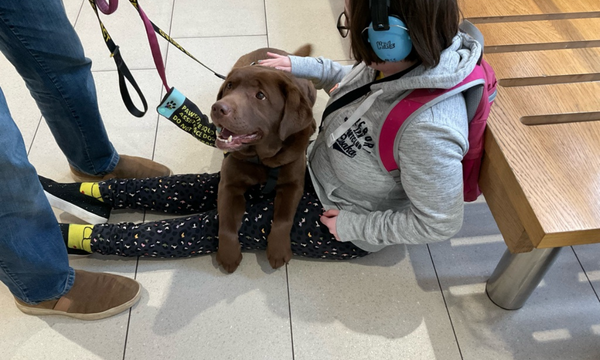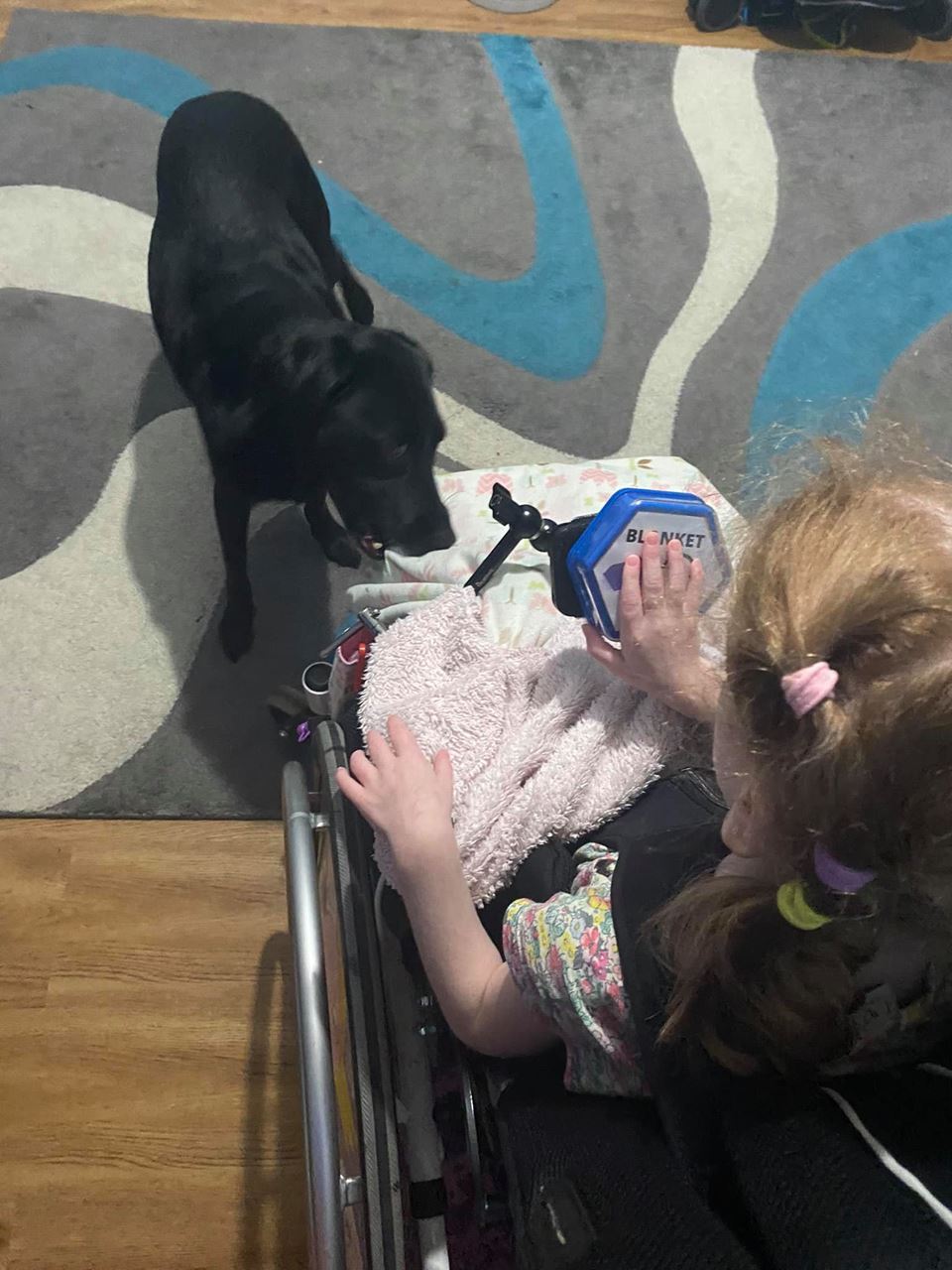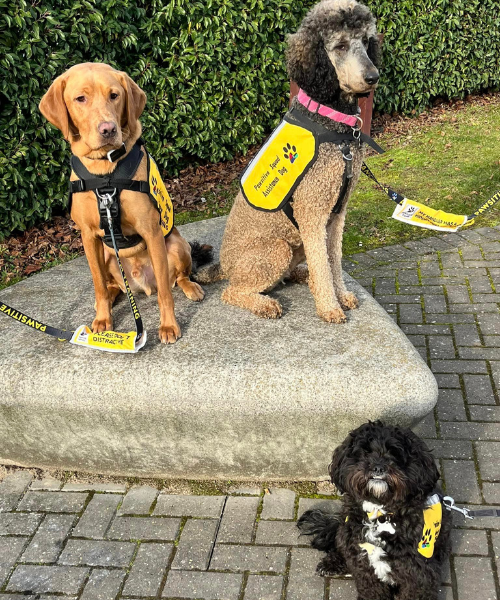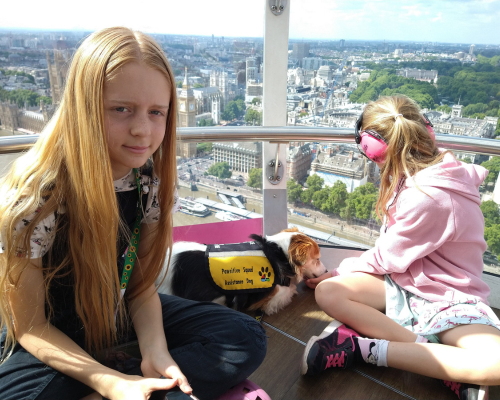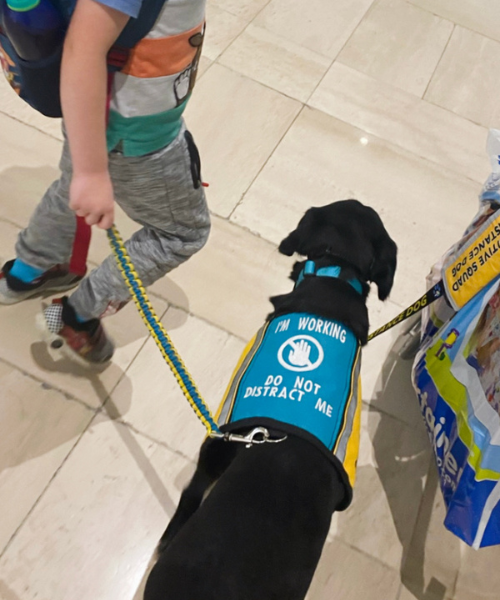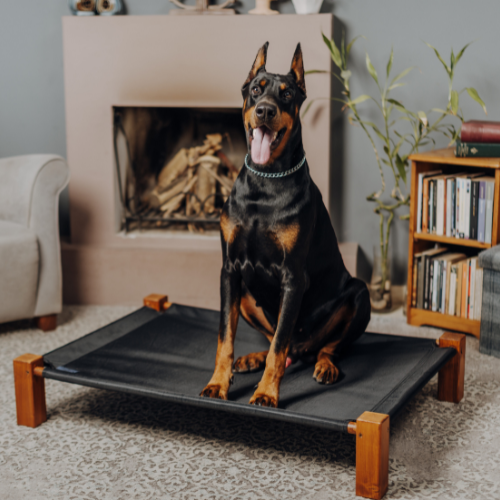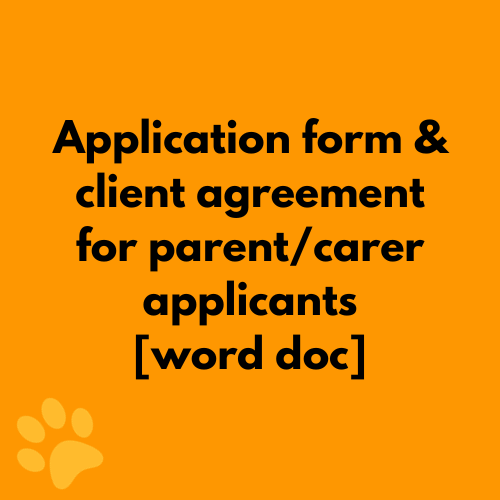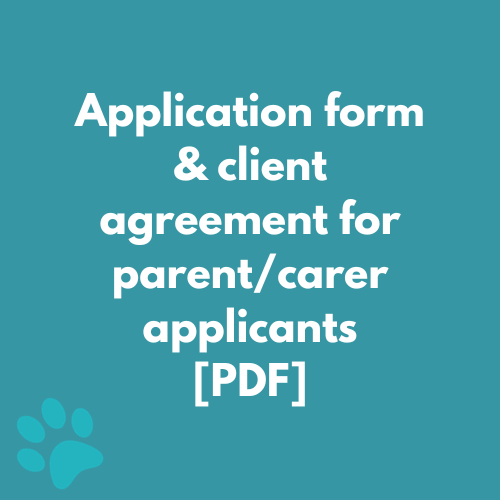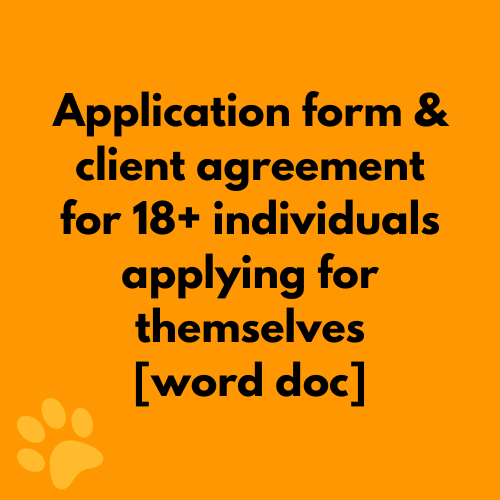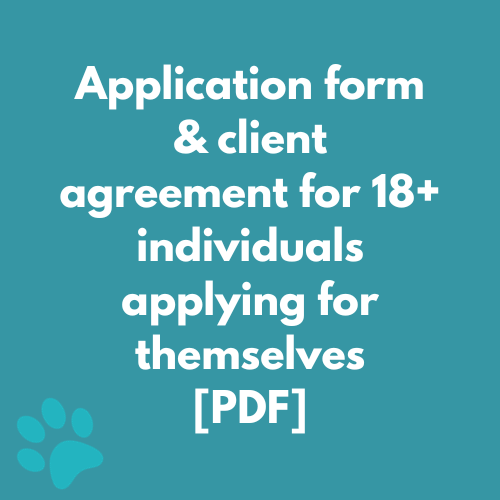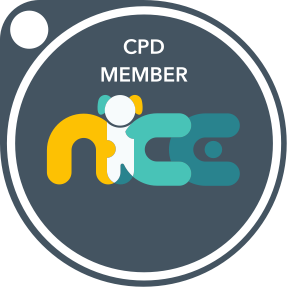Pawsitive Squad CIC Paws of Hope, Paws of Love, Paws of Life |
Assistance Dog Program
We are super excited you're considering training your dog to be an assistance dog with us!
Here at Pawsitive Squad we offer a multi-modal comprehensive national assistance dog program for a low monthly membership of just £45 per month for self funding families** while in training. Our program offers training via live small group zoom classes, in person monthly workshops in Nottingham and comprehensive virtual training zone!
Eligibility
Our assistance dog program is open to the following groups:
To be eligible you must meet the following criteria: "have a physical or mental impairment which has a substantial and long-term adverse effect on a person's ability to carry out normal day-to-day activities" (which is the definition of a disability outlined in the Equality Act, 2010), this is is a legal requirement for any one to have an assistance dog regardless of organisation or owner trained. AND Need at least 3 of the assistive tasks listed below in public spaces to significantly lessen the impact your disability has on your daily living. AND
|
|
Assistive tasks
To be eligible for our program 3 of the tasks must support your medical, care, emotional and support needs. We've split these into categories to make it easier to navigate but you can choose any of the tasks below as long as they support your specific needs relating to being disabled.
Tasks which support physical or mobility related needs
Sensory, emotional and mental health support tasks
Medical and Hearing alert & response tasks
|
|
Training & timetables
The main way clients access training is through our group zoom classes. We offer group zoom classes on Thursdays, Fridays and Saturdays. On some Sundays we offer one to one 20 minute zoom sessions and assessment virtual practice sessions. We also have a training zone right here on the website for clients which contains a mixture of written & video training resources for clients to work through in their own time. Finally, in Nottingham, We offer monthly group assessments and most months there are also task or behaviour specific 2-3 hour intensive training workshops. Some workshops are not open to bronze award clients. | .png) |
Cost
For families self funding the assistance dog program, we have a subsidised membership fee of £45 pcm.
For non-family funded places on the assistance dog program (e.g. paying through short breaks, charity funding, local authority funding, NHS continuing care budget, EHCP/ personal budget) the program costs a membership fee of £70 pcm. Please see the funding support paragraph below for more information on funding support options which may be available to you.
Upon passing the gold award, regardless of the funding method membership drops to £12.50pcm.
Funding Support
There maybe support available for fund the assistance dog program for you/ your child. Below is a list of some options which may be available to you.
1) Funding through your local authority including through short breaks. Some adult clients have been granted funding for 12 months of the assistance dog program as part of their social care provision. This is usually capped at 12 months however so it's important to have a plan for how you pay for the program moving forward. You would need to discuss this possibility with your social worker.
We have several families who have been granted permission to use their short breaks funding for the assistance dog program where the young person would not realistically be able to access other provisions where the primary care giver goes off site/ where they would go out with other carers. Most disabled young people who recieve mid or high DLA are eligible for short breaks funding. Search your local authority website for more information or speak with your social worker/ family support worker for more information. We have a proposal letter which can be downloaded here to submit to your local authority short breaks team to request permission to use the short breaks funding for us: Short breaks proposal for pawsitive squad assistance dog program .pdf
2) Funding through a personal budget as part of the EHCP - If the young person wanting to train their dog as an assistance dog is not able to access a full time education, the local authority may consider funding the assistance dog program as part of their educational provision. You can download a proposal letter for the assistance dog program as an educational provision here: Educational proposal for asistance dog program commissioning.pdf
please note, this is for the assistance dog program outlined here. For a more bespoke 1:1 animal centred educational provision, we have an alternative provision service. Please go to alternative provision to find out more.
3) Grants from disability-specific charities - There are lots of charities that provide grants to disabled children and young people, each coming with its own specific eligibility criteria. When looking to obtain a grant towards assistance dog training from charities, we recommend you apply to charities that offer support for your specific disability. Even if these charities are unable to support you, they may be able to signpost you towards other potential funders. Please note: Family Fund does not offer funding towards assistance dog training but may be able to contribute to the purchase price of your dog if you have not yet brought a dog.
4) Grants from accessing work & building better opportunities (BBO) projects and programs in your local area -This may be an option for prospective clients aged 16 - 25 if you would need an assistance dog to be able to access employment. Simply search for your local access to work/ building better opportunity project provider If they're not able to provide funding support they may be able to signpost you to potential funding sources.
5) Crowdfunding - There are several crowdfunding platforms where sharing your assistance dog aim may enable you to get donations from the general public towards your journey. Tree of Hope offers a crowdfunding platform through their charity which has lots of benefits including being able to add gift aid to donations and being more likely to obtain matched funding and corporate funding. Other crowdfunding platforms which may be suitable include Go Fund Me and Just Giving.
6) Personal Health Budgets from the NHS - If your receives continuing care from the NHS or you receive NHS Continuing Healthcare you're eligible for a personal health budget. In some circumstances, you may be able to use this personal health budget to fund your assistance dogs training. You can read about an assistance dog (not with Pawsitive Squad) who was trained using their personal budget by clicking here.
7) Other grant providers, community organisations etc - It maybe worth approaching your local rotary club or similar organisation to ask if they're able to provide funding support.
8) US - Where a young person has a significant life-threatening/ life-limiting condition (expected under 5 years) , we may be able to offer a discounted price to enable you to access the program. This would only be available to families who provide evidence of financial hardship and where all other avenues of potential funding have been exhausted.
Equipment
You will need: - A dog! (vaccinated, not raw fed, flea & wormed etc) and who doesn't have any major behavioural or emotional issues (if they are reactive, severely anxious or aggressive, please don't apply, you need to work through this with a behaviourist first!) - Appropriate non aversive collar & lead (we recommend a KUMFI harness as these fit well under our working vests and allow multiple contact points plus a lead, we recommend a HALTI training lead (NOT HEAD COLLAR THESE ARE NOT PERMITTED). - Dog treat pouch & a variety of training rewards - A variety of dog toys (you need at least 2 identical toys your dog likes, so if you find something they really enjoy get a few of them in the same colour please!) - Dog muzzle with pant room (your dog needs to be able to open their mouth in the muzzle) - First aid kit including at minimum non adhesive dressing, cotton bandages and vet wrap - Target stick (optional) - Long line (no extendable leads permitted!) - A portable fabric mat - A boundary for home - we recommend a raised bed but a standard dog bed or crate is fine as well. - Some sort of platform your dog, a good option is an exercise step or a couple of yoga blocks - At least 6 hard, non breakable cups - Food centred enrichment puzzle/ mat e.g. lick mat, slow feeder bowl, snuffle mat etc. |
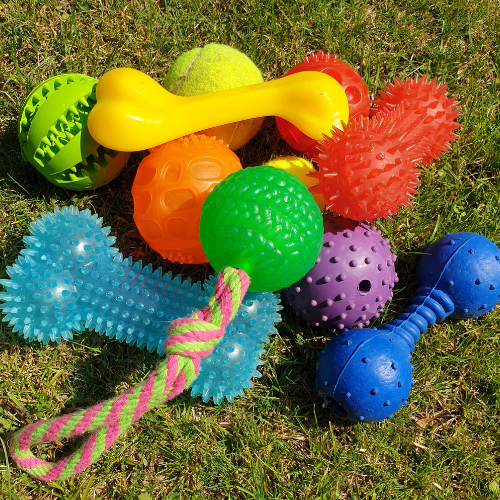 |
Commitment required
Training your dog to be an assistance dog is not a challenge which should be undertaken lightly. It's takes a lot of time and effort and full commitment because essentially you are providing the training to your dog to become a full time professional carer... and you wouldn't allow an under qualified and poorly trained human carer to support you/your child, would you?
Training an assistance dog isn't just slapping a jacket on, having them with a disabled person and taking them anywhere you please, it's far more complex than that. The dog needs to be impeccably trained - be able to maintain focus on their handler even when there's food on the floor, other dogs in the environment and people trying to distract them and they need to be able to reliably perform the tasks which decrease the impact of the persons disability in all environments, of course the dogs are dogs, living beings capable of making mistakes but their socialisation, training and the handlers education and handling skills should ensure mistakes are rare and the dogs maintain a high quality, reliable level of skills & obedience. Unfortunately, not all dogs are cut out to be assistance dogs, some are unsuitable due to breed suitability for the tasks required, personality, anxiety and desire to work.
As an assistance dog program clients with Pawsitive Squad, we have strict expectations of our clients which are laid out in the signed customer agreements, regrettably, if clients fail to meet and maintain the agreement requirements this would result in removal from the program except in exceptional circumstances. These requirements include:
- Commitment to being open and honest about your disabilities and needs including providing evidence when requested.
- Commitment to keep written records on the templates provided and uploading these 3 monthly by the due dates.
- Commitment to regularly attend classes, at least virtually once a month while assistance dog is in training.
- Commitment to doing structured training exercises with your dog whether at home or in public yourself at least 3 times a week.
Assessments and levels
Bronze Award
The first stage of our assistance dog program is the bronze award. This is 'pre assistance dog in training' status with us and covers important handling skills, obedience and canine theory - everything you and your dog need to know and do to be ready to begin public access and task training once they've passed the bronze award.
The great news is you can apply to start the bronze award right away! For more information on the bronze award please click here!
Silver Award & Gold Award
Once you've passed the bronze award your dog will become a Pawsitive Squad assistance dog in training and start working towards the silver award which mostly focuses on assessing your dogs public access skills and behaviours (such as can they tuck under a chair & can they walk through a shop without sniffing) and then on to the gold award which assesses that your dog is now reliably meeting the expectations of a fully train assistance dog AND that they can reliably perform three assistive tasks in public spaces.
Fully trained partnerships
Training doesn't just stop once you've passed the gold award! All clients will fully trained assistance dogs keep access to all of our training resources and are encouraged to continue attending classes occasionally to keep topped up on skills and develop new tasks as the needs of the young person change and develop. Fully trained partnerships continue to have some paperwork requirements including submitting annual reports, vet & vaccine records and health & care records and also have an annual reassessment each year to ensure the dog remains at the standard required of a fully trained assistance dog. Good news! While you keep access to all the provisions of the assistance dog program your fees reduce to just £12.50pcm once your dog is fully trained. This can be paid annually or monthly.
Ready to sign up?
You can sign up as soon as you're ready. We aim to have processed your membership and granted your access to begin training within 7 days of application & 100% score on our application quiz (https://www.surveymonkey.co.uk/r/WYFQFMY)
To consider your application, please submit the following to the drop box link below:
- The signed application form & client agreement (these are within the same document for easy access)
- Copy of your microchip registration (this must be in your name & under your current address)
- Evidence of insurance including public liability (at this stage just pet insurance is fine, you may need to change policies once they've passed the bronze award)
- Evidence your dog is up to date on their vaccinations. They must have had at least their first puppy vaccine to join but they can be due to have their next vaccine if aged under 16 weeks. For dogs over 12 months old they must be up to date with their boosters or you must provide evidence from titre testing proving immunity. The only vaccine NOT required under Pawsitive Squad is kennel cough.
Application quiz!
You must also score 100% on our application quiz - it's just 10 multiple choice questions can should take under 10 minutes, designed to ensure understanding of our expectations and the commitment required. Here is the link for the quiz. Please ensure your email address on the survey matches the email on your application: https://www.surveymonkey.co.uk/r/WYFQFMY
You can try this as many times as you need to but we do require a 100% score to process your application. All the information can be found either on the website areas about the assistance dog program or bronze award, the application form or the client agreement.
Please upload your fully completed application form, client agreement and your evidence here
(https://www.dropbox.com/request/mOtRVgCFY0L6sFOB691k)
FINAL Step of application!
PHEW! I realise all that admin can feel like an awful lot so if you've made it this far, thank you & well done!
Now you have:
1) Uploaded the fully completed & signed application document & client agreement AND microchip, vaccination & insurance evidence to the drop box link: https://www.dropbox.com/request/mOtRVgCFY0L6sFOB691k
2) Completed the application quiz and scored 100%
Once we've processed your application, if your application is successful we will send you a link to create your online profile for the website.
